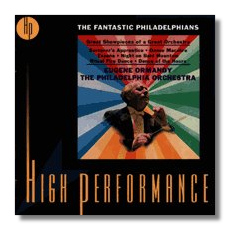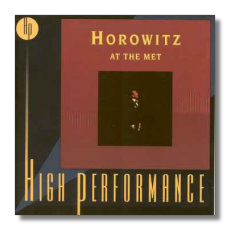
The Internet's Premier Classical Music Source
Related Links
- Latest Reviews
- More Reviews
-
By Composer
-
Collections
DVD & Blu-ray
Books
Concert Reviews
Articles/Interviews
Software
Audio
Search Amazon
Recommended Links
Site News
 CD Review
CD Review
RCA High Performance

The Fantastic Philadelphians
- Johannes Brahms: Hungarian Dance #5 for Orchestra
- Paul Dukas: L'apprenti sorcier
- Reinhold Glière: The Red Poppy: Russian Sailors' Dance
- Amilcare Ponchielli: La Gioconda: Dance of the Hours
- Modest Mussorgsky: Night on Bare Mountain
- Camille Saint-Saëns:
- Danse macabre
- Samson et Dalila, Op. 47: Bacchanale
- Bedřich Smetana: Bartered Bride, Dance of the Comedians
- Dmitri Kabalevsky: Comedians Suite, Op. 26: Galop
- Emmanuel Chabrier: España
- Manuel de Falla: El amor brujo "Ritual Fire Dance"
Philadelphia Orchestra/Eugene Ormandy
RCA High Performance 09026-63313-2 ADD 74:40


Horowitz At The Met
- Domenico Scarlatti: Six sonatas
- Frédéric Chopin:
- Ballade #4
- Waltz, Op. 69 #1, "L'adieu"
- Franz Liszt: Ballade #2
- Sergei Rachmaninoff: Prélude in G minor, Op. 23, #5
Vladimir Horowitz, piano
RCA High Performance 09026-63314-2 DDD 49:33


Suites for Orchestra
- Béla Bartók: Suite "The Miraculous Mandarin"
- Paul Hindemith: Nobilissima visione
- Edgard Varèse: Arcana
Chicago Symphony Orchestra/Jean Martinon
RCA High Performance 09026-63315-2 ADD 60:19
These are three new releases in BMG Classics' "High Performance" series. This series surveys noteworthy RCA recordings from the years immediately following the "Living Stereo" era up until the dawn of the CDs. Reissues have been chosen on the basis of both musical merit and sound quality; 24-bit resolution and a 96-kHz sampling rate have been used to maximize the frequency and dynamic range of the remasterings. The first five releases were gratifying to audiophiles, and they also gave everyday admirers of vintage recordings something to smile about too, because most of the recordings were new to CD.
In their days with Columbia Records, Eugene Ormandy and the Philadelphia Orchestra released a series of LPs showcasing the artistry of the Orchestra's first-chair players. In the process, relatively unfamiliar concertante works by composers such as Creston and Griffes found their way to disc, often for the first time. By the time the early 1970s had rolled around, RCA Victor was taking a different approach, at least with The Fantastic Philadelphians. The repertoire was as mainstream as can be, and the opportunities for solo work were more limited. Nevertheless, the annotations dutifully note who the "star players" are. For example, John De Lancie plays the oboe solo near the end of Mussorgsky's Night on Bald Mountain, harpist Marilyn Costello can be clearly heard in both Chabrier's España and Ponchielli's Dance of the Hours, and xylophonist Charles Owen hits the bones in Saint-Saëns's Danse macabre.
Ormandy made his fame by recording popular works such as these, and he did it very well. I find this ironic, because Ormandy truly distinguishes himself in bigger works, and at least for me, his most memorable recordings feature him and the Philadelphians in music that is not quite in the mainstream (late Shostakovich symphonies and Sibelius's Four Legends from the 'Kalevala', for example). On The Fantastic Philadelphians, many of Ormandy's interpretations are decidedly on the mellow side; no one will accuse him of using cheap methods to whip up excitement. Danse macabre sounds almost like sleepwalking. Nevertheless, not a hair is out of place in these readings – they embody committed professionalism. The Ponchielli is one of the most successful selections: Ormandy exquisitely colors the first part of the ballet, and the final galop is done with pulse-quickening panache. Sonically, this CD is very impressive. The sound is full-bodied and clear at any volume level and at any density of scoring.
Horowitz's program was recorded on November 1, 1981 on the stage of the Metropolitan Opera House. The 78-year-old virtuoso was in excellent latter-day form that night, and the audience was very much on his side, as can be heard from the vociferous responses to his playing. It's easy to feel the love going in both directions.
The opening set of sonatas by Scarlatti is played with a coyly Romantic spirit, particularly in the F-Minor Sonata (Kk.466, L.118), which is like a young girl's whispery giggle here. Next, Horowitz moves on to a windswept Chopin Ballade, and then a more unusual Ballade by Liszt. This stretches the pianist's technique to the limits, and there are a few garbled passages - nothing to get too upset over, however, and his interpretation brings the music's fantasy to life. The Chopin Waltz and the Rachmaninoff Prélude are tossed off like mere nothings, off-handedly, as if to say to the audience "What a good boy am I!" All of these performances are very typical of the pianist: in softer music, his tone is uncannily caressing and bell-like, and his legato remains formidable even in louder passages. In the latter, he thunders, to the point where one wonders whether the piano can take such punishment. His approach to the music is outgoing, and if Horowitz seems perhaps overly concerned with wowing his listeners, at least he has something worth making them wow about. The live recording has transferred well to CD, and the new 24/96 remastering captures much of the live performance's sonic excitement.
Although conductor Jean Martinon's tenure with the Chicago Symphony Orchestra was brief and not particularly happy, he did leave behind some noteworthy recordings. A Nielsen "Inextinguishable" is distinctive (not available in the United States), and so is this coupling of three 20th-century scores. Recorded in 1967, the Bartók and Hindemith appeared on either side of a single LP. The Varèse was recorded a year earlier, and it was coupled with Frank Martin's Concerto for Seven Wind Instruments, Timpani, Percussion and String Orchestra, another fine recording well worth reissuing.
The somewhat unrealistic spotlighting of individual instruments (the piano in the Bartók, the small percussion instruments in the Varèse) suggests that RCA was using many microphones in Medinah Temple and Orchestra Hall at the time these performances were taped. Otherwise, the engineering stands the test of time - the explosive Arcana continues to challenge recording technology. Martinon's conducting is unfussy. Rather than lingering, he moves the music along and shapes its overall architecture. Nevertheless, he is sensitive to color, and these three scores give him ample opportunity to demonstrate this. The Miraculous Mandarin is good enough to make one regret that he didn't record the entire score, and the opening section, depicting the city's bustle, is especially harrowing. Martinon emphasizes the simplicity of Nobilissima visione and the chamber music-like qualities of Arcana. His restraint prevents these challenging scores from becoming fatiguing.
BMG Classics has announced the release of two more High Performance titles in August: Ives' Second and Fourth Symphonies (Ormandy and Serebrier conducting), and a Handel Messiah with Richard Westenburg and Musica Sacra.
Copyright © 1999, Raymond Tuttle



















